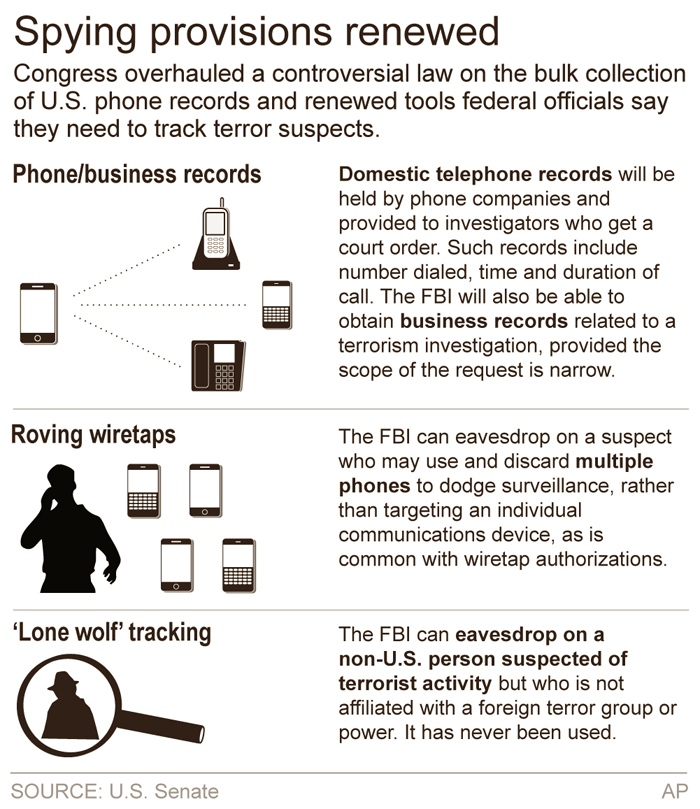It was touch and go, but last week’s dramatic conclusion to the Senate debate over government surveillance reform was a major boon for advocates of separate cybersecurity information-sharing legislation.
The biggest roadblock to Senate action on the cyber bill — debate over National Security Agency authorities under the USA Patriot Act — was demolished last week when the “USA Freedom Act” cleared the Senate, 67-32, despite the vociferous opposition of Majority Leader Mitch McConnell, R-Ky., and the grandstanding floor tactics of Sen. Rand Paul, R-Ky.
McConnell angrily wrapped up the NSA debate by charging that his colleagues were undermining U.S. security.
But the Senate overwhelmingly rejected four amendments to the legislation proposed by McConnell and Senate Intelligence Chairman Richard Burr, R-N.C., and instead sent the House-passed “Freedom Act” to the president last Tuesday. President Obama signed it into law hours later.
The technology sector rejoiced, hopeful that the reforms would help restore the luster of U.S. tech products overseas.
Online privacy advocates declared victory with the imminent demise of the hated NSA bulk data-collection program.
And the White House, industry groups and key members of Congress all breathed a huge sigh of relief that cyber info-sharing was finally poised to get its moment on the Senate floor, perhaps in the next few weeks.
The complicated but much less controversial cyber info-sharing bill is on the Senate Republican leadership’s list of items for possible consideration in June. The bill cleared the Senate Intelligence Committee back in March on a 14-1 vote, but couldn’t get on the floor schedule with the NSA debate in the way.
“We are really optimistic,” Ari Schwartz, who manages cybersecurity issues for the White House National Security Council, told InsideCybersecurity.com last week. Schwartz wouldn’t discuss the specifics of lingering issues with the Senate bill, but expressed confidence they could be worked out.
The administration isn’t formally endorsing cyber legislation at this point but is strongly urging Congress to move the process along toward final negotiations. The White House seems quite eager for an info-sharing bill that Obama can sign into law this year.
White House officials have raised questions about liability relief provisions in the House version of the legislation, which cleared that chamber in late April with over 300 votes.
They are also concerned that the House approach encourages industry sharing of threat indicators with too many different government entities. The Obama administration wants to encourage and incentivize industry-to-government sharing through a Department of Homeland Security-run “portal.” Such an approach would help ensure a uniform approach to data privacy, for one thing.
Schwartz said the White House is “open to discussion on all of these issues” and has had “great” conversations already with lawmakers and staff.
The excitement was also rippling through the lobbying community in the aftermath of the Senate action on the NSA issue.
“It looks like information sharing will be moving up,” a financial industry source said with enthusiasm. “If Congress can pass that, it’ll really be a feather in the cap.”
This source said the outstanding issues with the House and Senate versions of the information-sharing bills are matters of “language” rather than substance.
And, this source added, “The fact that the USA Freedom Act debate wasn’t too bruising will help.”
The debate was bruising for some, most notably Mitch McConnell, but it didn’t leave the kind of legislative scars that could haunt action on a remotely similar issue like cybersecurity.
McConnell has already said cybersecurity is the type of bipartisan issue he wants to bring to the floor in his declared bid to oversee a newly functional Senate.
Still, there will be bumps. Sen. Ron Wyden, D-Ore., who helped lead the fight for NSA reform, has denounced the info-sharing bill as just another way of enabling government snooping.
Online privacy and civil liberties groups will gin up opposition to the info-sharing bill too.
“We’re not supporters” of the Cyber Information Sharing Act, Gregory Nojeim of the Center for Democracy and Technology made clear last week. “Significant amendments would be required in order to gain our support. They aren’t likely to be adopted.”
Passage of surveillance reform may take some of the sting out of the privacy advocates’ arguments.
Business sources believe the privacy and civil liberties argument will be much less potent in the cybersecurity debate than it was in the fight over NSA reform. For one thing, the Senate bill prohibits direct industry-to-NSA information sharing.
A handful of Democrats who voted for the USA Freedom Act, including Wyden, will probably turn around and vote against the cyber info-sharing bill.
But many of the 31 Republicans who voted against the surveillance reform bill almost certainly will vote for the industry-backed info-sharing proposal developed by Burr and Dianne Feinstein, D-Calif.
Rand Paul may or may not vote for the info-sharing bill; he hasn’t been very vocal on this one. The eventual floor vote on the Cyber Information Sharing Act won’t provide the same platform for floor theatrics that Paul took advantage of during the NSA debate.
Industry groups are confident that a major hurdle has been overcome and long-sought cyber legislation will finally be enacted in the coming months.
“If we don’t get it done by October, I will be surprised,” commented Larry Clinton, president of the Internet Security Alliance.
Charlie Mitchell is editor of InsideCybersecurity.com, an exclusive service covering cybersecurity policy from Inside Washington Publishers.

